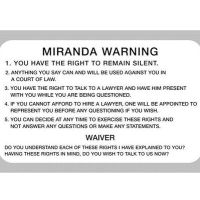Supreme Court Rules a Suspect’s Silence during Police Interrogation Can be Used against Him

Remaining silent during questioning by police can be used against a person in a court of law, the U.S. Supreme Court has ruled (pdf) in a startling reinterpretation of Fifth Amendment rights.
A narrow majority ruled 5-to-4 in Salinas v. Texas that it was permissible for authorities to present at Genovevo Salinas’ trial that he refused to answer the police’s questions about a fatal shooting because Salinas had already answered some questions prior to being arrested and read his Miranda rights.
Salinas voluntarily spoke with police about the December 1992 murders of Juan and Hector Garza in Houston. But when asked whether the shells found at the scene would match a shotgun found in his home, the defendant went silent and refused to answer.
A ballistics test subsequently showed the shells were fired from Salinas’ weapon. Prosecutors used the fact that Salinas did not respond to the question about the shells, and appeared nervous, as a further argument to convince jurors of his guilt. Also presented was testimony from a witness who said Salinas took credit for the killings.
Salinas’s first trial ended in a mistrial. A second trial resulted in his being convicted and sentenced to 20 years to life in prison.
He later appealed, arguing that prosecutors had violated his right to stay silent. Salinas’ silence as evidence of possible guilt should have been omitted from the trial, claimed his lawyer, citing the Fifth Amendment’s protection against self-incrimination.
Justices Samuel Alito, Anthony Kennedy, Clarence Thomas, Antonin Scalia and Chief Justice John Roberts disagreed with Salinas’ argument and validated his conviction. Their ruling states that Salinas would have to have voluntarily invoked his Fifth Amendment right in order to be protected by it.
Critics claim that this ruling damages the spirit of the Fifth Amendment and will hereafter give law enforcement an incentive to delay the reading of Miranda warnings—the right to remain silent—to criminal suspects.
-Noel Brinkerhoff, Danny Biederman
To Learn More:
The Price of Silence: Supreme Court Rules That Pre-Miranda Silence Can Be Used Against Defendant To Prove Guilt (by Jonathan Turley)
Fifth Amendment Can't Shield Selective Answers (by Dan McCue, Courthouse News Service)
Goodbye 5th Amendment? Supremes Rule Silence Can be used in Court (by Tiffany Madison, Washington Times)
Court Ruling: Salinas v. Texas (U.S. Supreme Court) (pdf)
Kentucky Supreme Court Case Questions whether Students Deserve the Right to Remain Silent (by Noel Brinkerhoff, AllGov)
Obama Administration Says Miranda Warning Doesn’t Count for Terror Suspects (by Noel Brinkerhoff, AllGov)
- Top Stories
- Unusual News
- Where is the Money Going?
- Controversies
- U.S. and the World
- Appointments and Resignations
- Latest News
- What If China Invaded the United States?
- Donald Trump Has a Mental Health Problem and It Has a Name
- Trump Goes on Renaming Frenzy
- Trump Deports JD Vance and His Wife
- Trump Offers to Return Alaska to Russia






Comments